Ethical Considerations in Abdul's Treatment: A Case Study Analysis
VerifiedAdded on 2023/01/06
|12
|3258
|100
Case Study
AI Summary
This case study focuses on Abdul, a 15-year-old boy suffering from a rare malignant blood condition, and the ethical dilemmas surrounding his treatment. Abdul's doctor recommends a new, potentially risky treatment, but his parents are hesitant, while Abdul strongly desires the treatment. The study explores the ethical issues, including patient autonomy versus parental consent, and the application of ethical principles like informed consent and negligence. It examines the roles of various stakeholders, including the patient, parents, doctors, and nurses, and analyzes the legal ramifications, particularly the Nursing Code of Ethics. The case study delves into the evaluation of issues, legal principles, and ethical decision-making steps to determine the most appropriate course of action, considering the patient's wishes, parental concerns, and legal guidelines, ultimately highlighting the complexities of making critical medical decisions.
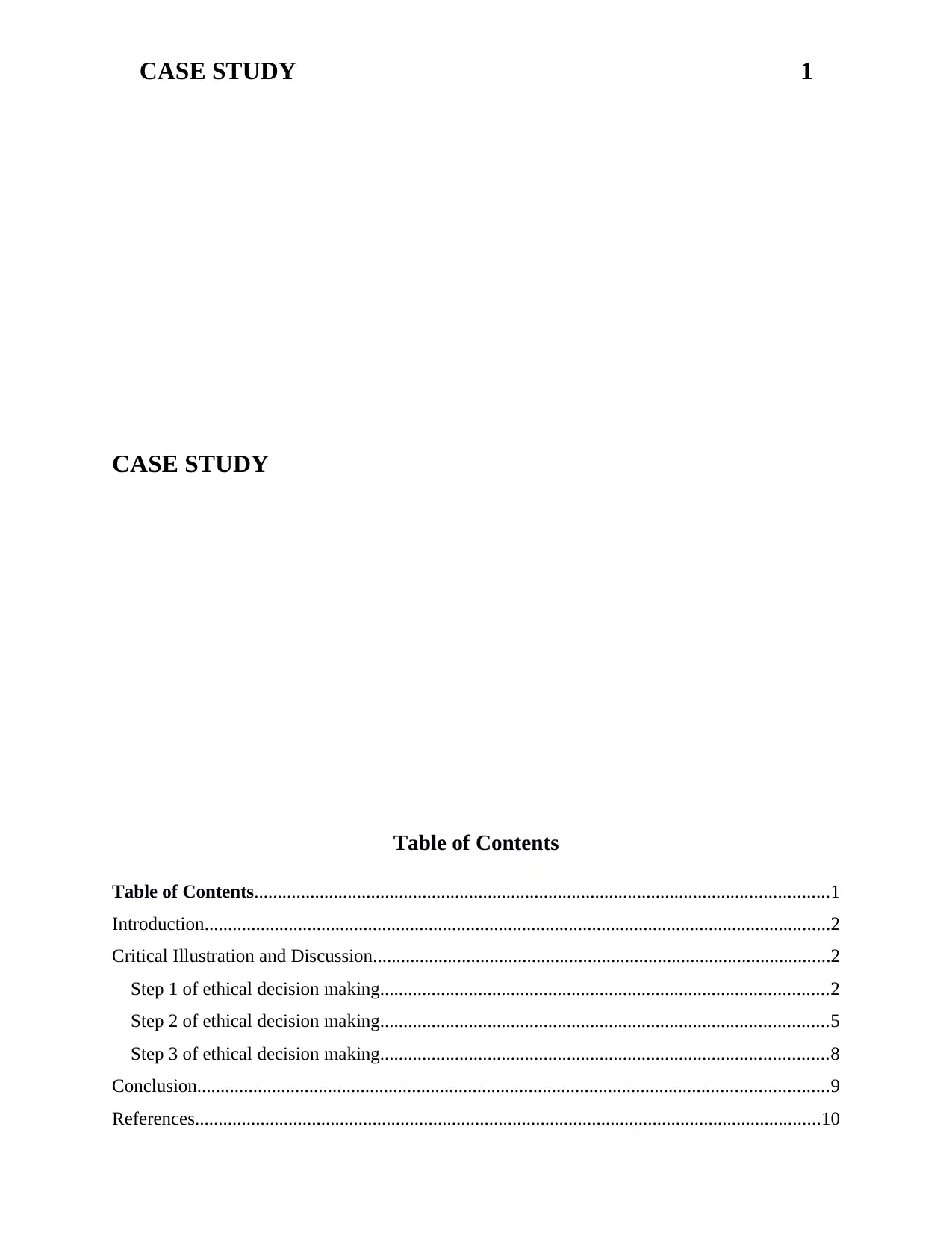
CASE STUDY 1
CASE STUDY
Table of Contents
Table of Contents...........................................................................................................................1
Introduction......................................................................................................................................2
Critical Illustration and Discussion..................................................................................................2
Step 1 of ethical decision making................................................................................................2
Step 2 of ethical decision making................................................................................................5
Step 3 of ethical decision making................................................................................................8
Conclusion.......................................................................................................................................9
References......................................................................................................................................10
CASE STUDY
Table of Contents
Table of Contents...........................................................................................................................1
Introduction......................................................................................................................................2
Critical Illustration and Discussion..................................................................................................2
Step 1 of ethical decision making................................................................................................2
Step 2 of ethical decision making................................................................................................5
Step 3 of ethical decision making................................................................................................8
Conclusion.......................................................................................................................................9
References......................................................................................................................................10
Paraphrase This Document
Need a fresh take? Get an instant paraphrase of this document with our AI Paraphraser
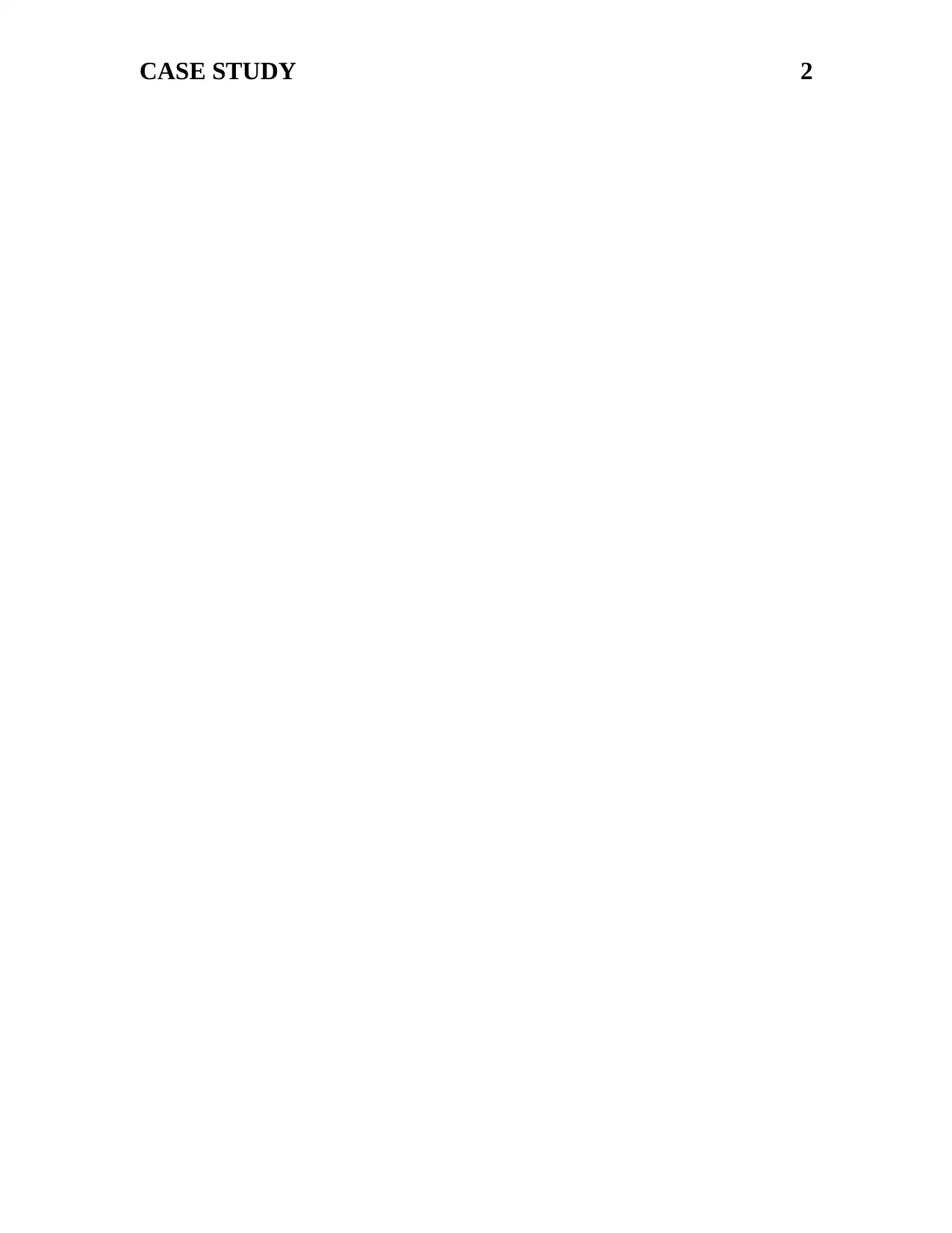
CASE STUDY 2
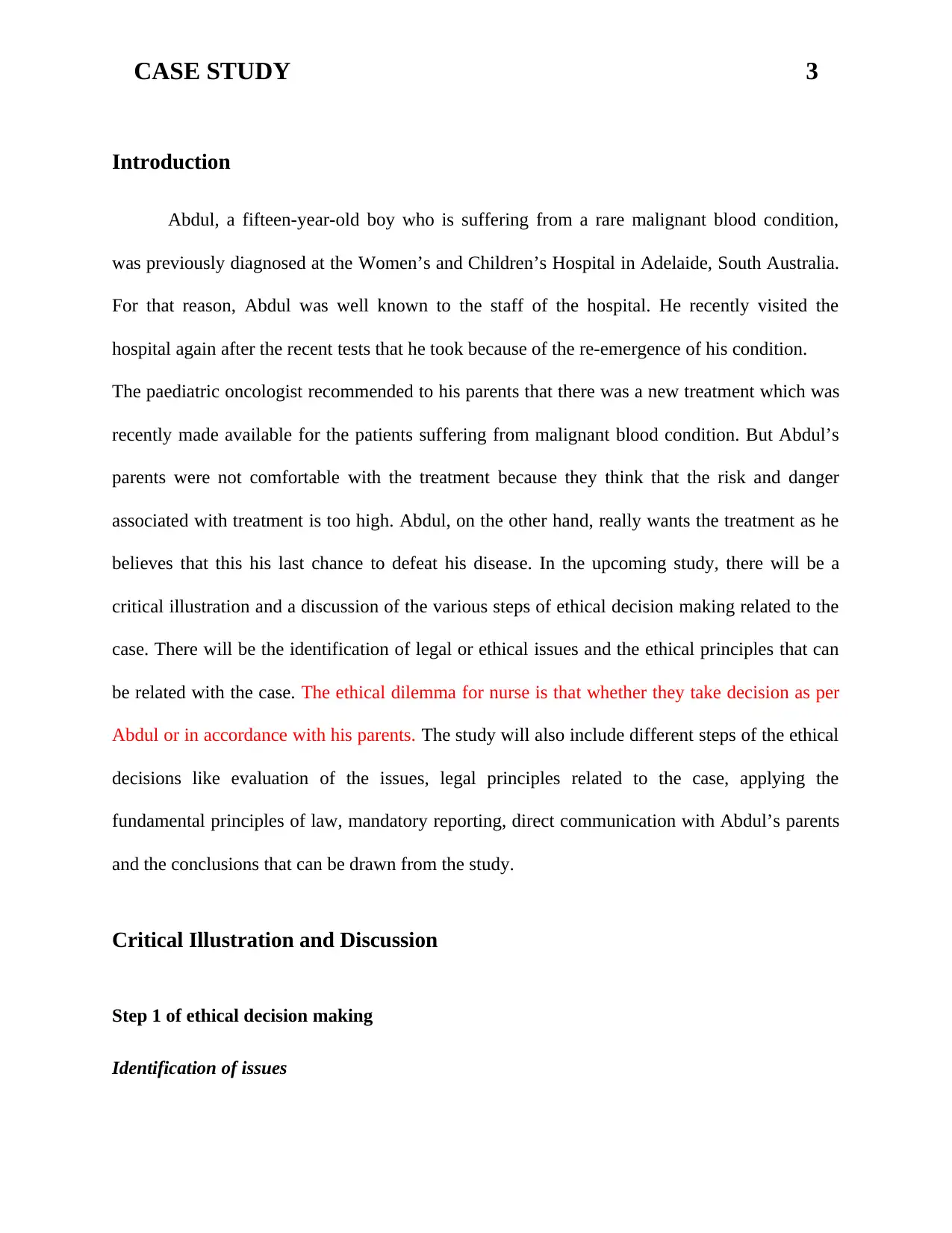
CASE STUDY 3
Introduction
Abdul, a fifteen-year-old boy who is suffering from a rare malignant blood condition,
was previously diagnosed at the Women’s and Children’s Hospital in Adelaide, South Australia.
For that reason, Abdul was well known to the staff of the hospital. He recently visited the
hospital again after the recent tests that he took because of the re-emergence of his condition.
The paediatric oncologist recommended to his parents that there was a new treatment which was
recently made available for the patients suffering from malignant blood condition. But Abdul’s
parents were not comfortable with the treatment because they think that the risk and danger
associated with treatment is too high. Abdul, on the other hand, really wants the treatment as he
believes that this his last chance to defeat his disease. In the upcoming study, there will be a
critical illustration and a discussion of the various steps of ethical decision making related to the
case. There will be the identification of legal or ethical issues and the ethical principles that can
be related with the case. The ethical dilemma for nurse is that whether they take decision as per
Abdul or in accordance with his parents. The study will also include different steps of the ethical
decisions like evaluation of the issues, legal principles related to the case, applying the
fundamental principles of law, mandatory reporting, direct communication with Abdul’s parents
and the conclusions that can be drawn from the study.
Critical Illustration and Discussion
Step 1 of ethical decision making
Identification of issues
Introduction
Abdul, a fifteen-year-old boy who is suffering from a rare malignant blood condition,
was previously diagnosed at the Women’s and Children’s Hospital in Adelaide, South Australia.
For that reason, Abdul was well known to the staff of the hospital. He recently visited the
hospital again after the recent tests that he took because of the re-emergence of his condition.
The paediatric oncologist recommended to his parents that there was a new treatment which was
recently made available for the patients suffering from malignant blood condition. But Abdul’s
parents were not comfortable with the treatment because they think that the risk and danger
associated with treatment is too high. Abdul, on the other hand, really wants the treatment as he
believes that this his last chance to defeat his disease. In the upcoming study, there will be a
critical illustration and a discussion of the various steps of ethical decision making related to the
case. There will be the identification of legal or ethical issues and the ethical principles that can
be related with the case. The ethical dilemma for nurse is that whether they take decision as per
Abdul or in accordance with his parents. The study will also include different steps of the ethical
decisions like evaluation of the issues, legal principles related to the case, applying the
fundamental principles of law, mandatory reporting, direct communication with Abdul’s parents
and the conclusions that can be drawn from the study.
Critical Illustration and Discussion
Step 1 of ethical decision making
Identification of issues
⊘ This is a preview!⊘
Do you want full access?
Subscribe today to unlock all pages.

Trusted by 1+ million students worldwide
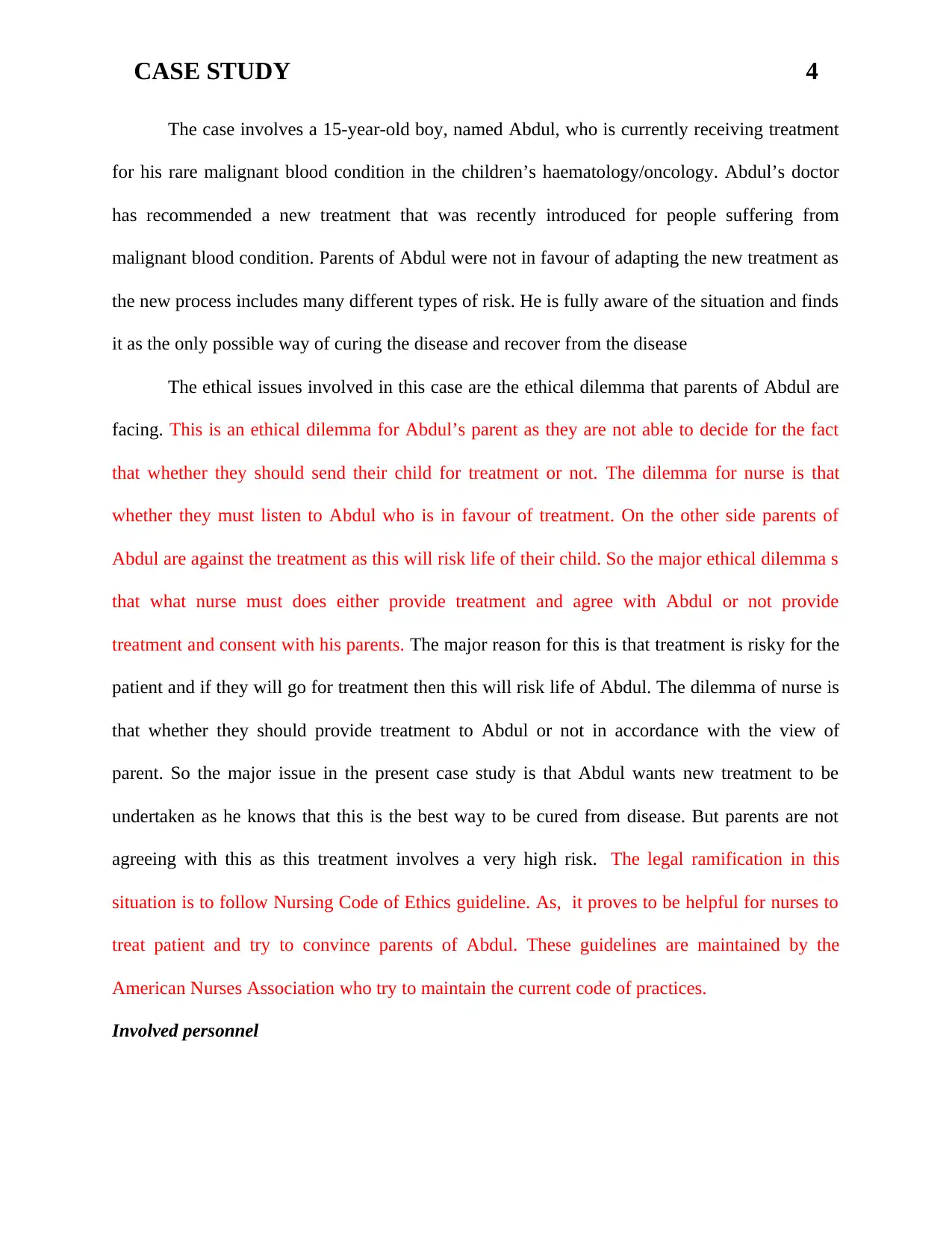
CASE STUDY 4
The case involves a 15-year-old boy, named Abdul, who is currently receiving treatment
for his rare malignant blood condition in the children’s haematology/oncology. Abdul’s doctor
has recommended a new treatment that was recently introduced for people suffering from
malignant blood condition. Parents of Abdul were not in favour of adapting the new treatment as
the new process includes many different types of risk. He is fully aware of the situation and finds
it as the only possible way of curing the disease and recover from the disease
The ethical issues involved in this case are the ethical dilemma that parents of Abdul are
facing. This is an ethical dilemma for Abdul’s parent as they are not able to decide for the fact
that whether they should send their child for treatment or not. The dilemma for nurse is that
whether they must listen to Abdul who is in favour of treatment. On the other side parents of
Abdul are against the treatment as this will risk life of their child. So the major ethical dilemma s
that what nurse must does either provide treatment and agree with Abdul or not provide
treatment and consent with his parents. The major reason for this is that treatment is risky for the
patient and if they will go for treatment then this will risk life of Abdul. The dilemma of nurse is
that whether they should provide treatment to Abdul or not in accordance with the view of
parent. So the major issue in the present case study is that Abdul wants new treatment to be
undertaken as he knows that this is the best way to be cured from disease. But parents are not
agreeing with this as this treatment involves a very high risk. The legal ramification in this
situation is to follow Nursing Code of Ethics guideline. As, it proves to be helpful for nurses to
treat patient and try to convince parents of Abdul. These guidelines are maintained by the
American Nurses Association who try to maintain the current code of practices.
Involved personnel
The case involves a 15-year-old boy, named Abdul, who is currently receiving treatment
for his rare malignant blood condition in the children’s haematology/oncology. Abdul’s doctor
has recommended a new treatment that was recently introduced for people suffering from
malignant blood condition. Parents of Abdul were not in favour of adapting the new treatment as
the new process includes many different types of risk. He is fully aware of the situation and finds
it as the only possible way of curing the disease and recover from the disease
The ethical issues involved in this case are the ethical dilemma that parents of Abdul are
facing. This is an ethical dilemma for Abdul’s parent as they are not able to decide for the fact
that whether they should send their child for treatment or not. The dilemma for nurse is that
whether they must listen to Abdul who is in favour of treatment. On the other side parents of
Abdul are against the treatment as this will risk life of their child. So the major ethical dilemma s
that what nurse must does either provide treatment and agree with Abdul or not provide
treatment and consent with his parents. The major reason for this is that treatment is risky for the
patient and if they will go for treatment then this will risk life of Abdul. The dilemma of nurse is
that whether they should provide treatment to Abdul or not in accordance with the view of
parent. So the major issue in the present case study is that Abdul wants new treatment to be
undertaken as he knows that this is the best way to be cured from disease. But parents are not
agreeing with this as this treatment involves a very high risk. The legal ramification in this
situation is to follow Nursing Code of Ethics guideline. As, it proves to be helpful for nurses to
treat patient and try to convince parents of Abdul. These guidelines are maintained by the
American Nurses Association who try to maintain the current code of practices.
Involved personnel
Paraphrase This Document
Need a fresh take? Get an instant paraphrase of this document with our AI Paraphraser
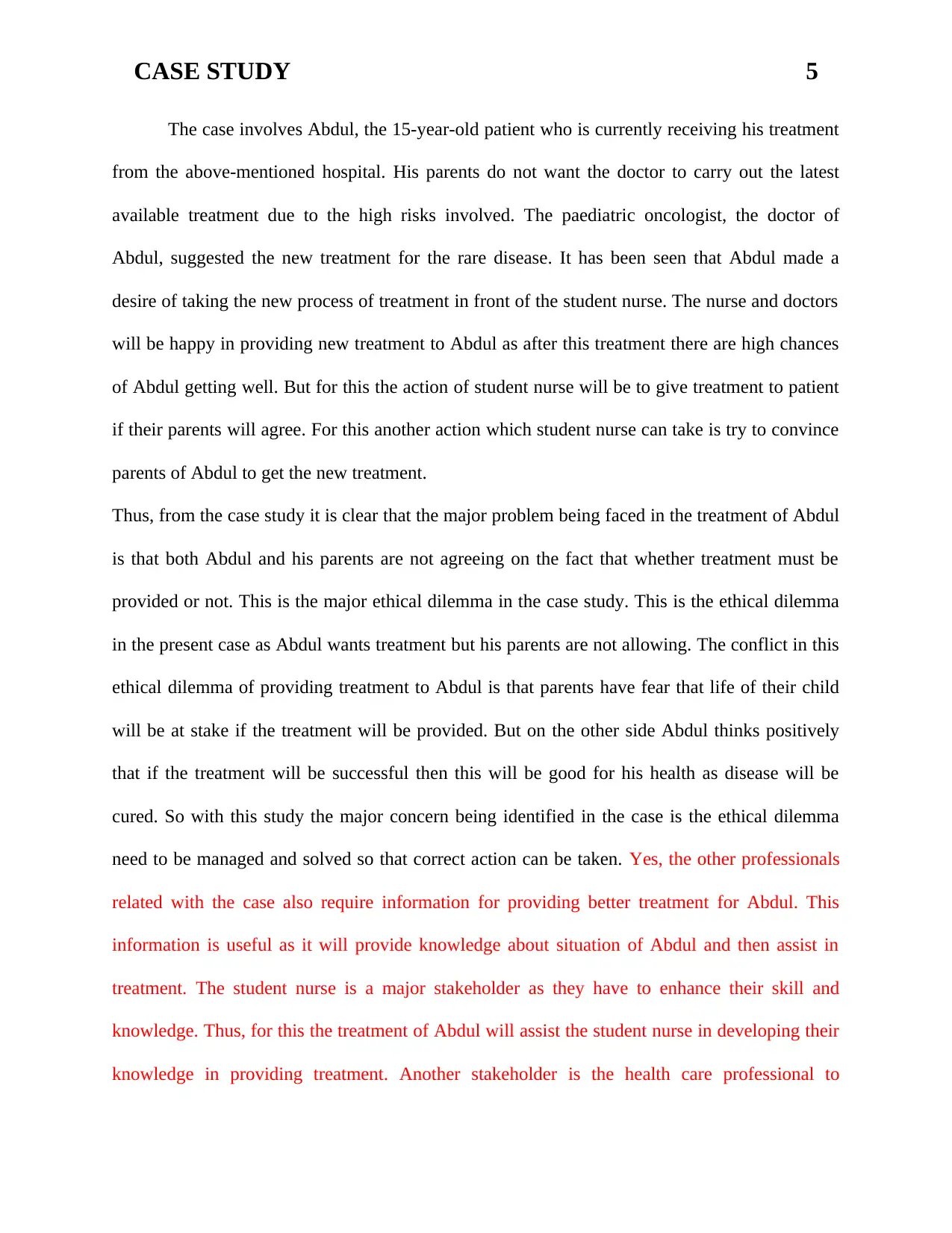
CASE STUDY 5
The case involves Abdul, the 15-year-old patient who is currently receiving his treatment
from the above-mentioned hospital. His parents do not want the doctor to carry out the latest
available treatment due to the high risks involved. The paediatric oncologist, the doctor of
Abdul, suggested the new treatment for the rare disease. It has been seen that Abdul made a
desire of taking the new process of treatment in front of the student nurse. The nurse and doctors
will be happy in providing new treatment to Abdul as after this treatment there are high chances
of Abdul getting well. But for this the action of student nurse will be to give treatment to patient
if their parents will agree. For this another action which student nurse can take is try to convince
parents of Abdul to get the new treatment.
Thus, from the case study it is clear that the major problem being faced in the treatment of Abdul
is that both Abdul and his parents are not agreeing on the fact that whether treatment must be
provided or not. This is the major ethical dilemma in the case study. This is the ethical dilemma
in the present case as Abdul wants treatment but his parents are not allowing. The conflict in this
ethical dilemma of providing treatment to Abdul is that parents have fear that life of their child
will be at stake if the treatment will be provided. But on the other side Abdul thinks positively
that if the treatment will be successful then this will be good for his health as disease will be
cured. So with this study the major concern being identified in the case is the ethical dilemma
need to be managed and solved so that correct action can be taken. Yes, the other professionals
related with the case also require information for providing better treatment for Abdul. This
information is useful as it will provide knowledge about situation of Abdul and then assist in
treatment. The student nurse is a major stakeholder as they have to enhance their skill and
knowledge. Thus, for this the treatment of Abdul will assist the student nurse in developing their
knowledge in providing treatment. Another stakeholder is the health care professional to
The case involves Abdul, the 15-year-old patient who is currently receiving his treatment
from the above-mentioned hospital. His parents do not want the doctor to carry out the latest
available treatment due to the high risks involved. The paediatric oncologist, the doctor of
Abdul, suggested the new treatment for the rare disease. It has been seen that Abdul made a
desire of taking the new process of treatment in front of the student nurse. The nurse and doctors
will be happy in providing new treatment to Abdul as after this treatment there are high chances
of Abdul getting well. But for this the action of student nurse will be to give treatment to patient
if their parents will agree. For this another action which student nurse can take is try to convince
parents of Abdul to get the new treatment.
Thus, from the case study it is clear that the major problem being faced in the treatment of Abdul
is that both Abdul and his parents are not agreeing on the fact that whether treatment must be
provided or not. This is the major ethical dilemma in the case study. This is the ethical dilemma
in the present case as Abdul wants treatment but his parents are not allowing. The conflict in this
ethical dilemma of providing treatment to Abdul is that parents have fear that life of their child
will be at stake if the treatment will be provided. But on the other side Abdul thinks positively
that if the treatment will be successful then this will be good for his health as disease will be
cured. So with this study the major concern being identified in the case is the ethical dilemma
need to be managed and solved so that correct action can be taken. Yes, the other professionals
related with the case also require information for providing better treatment for Abdul. This
information is useful as it will provide knowledge about situation of Abdul and then assist in
treatment. The student nurse is a major stakeholder as they have to enhance their skill and
knowledge. Thus, for this the treatment of Abdul will assist the student nurse in developing their
knowledge in providing treatment. Another stakeholder is the health care professional to
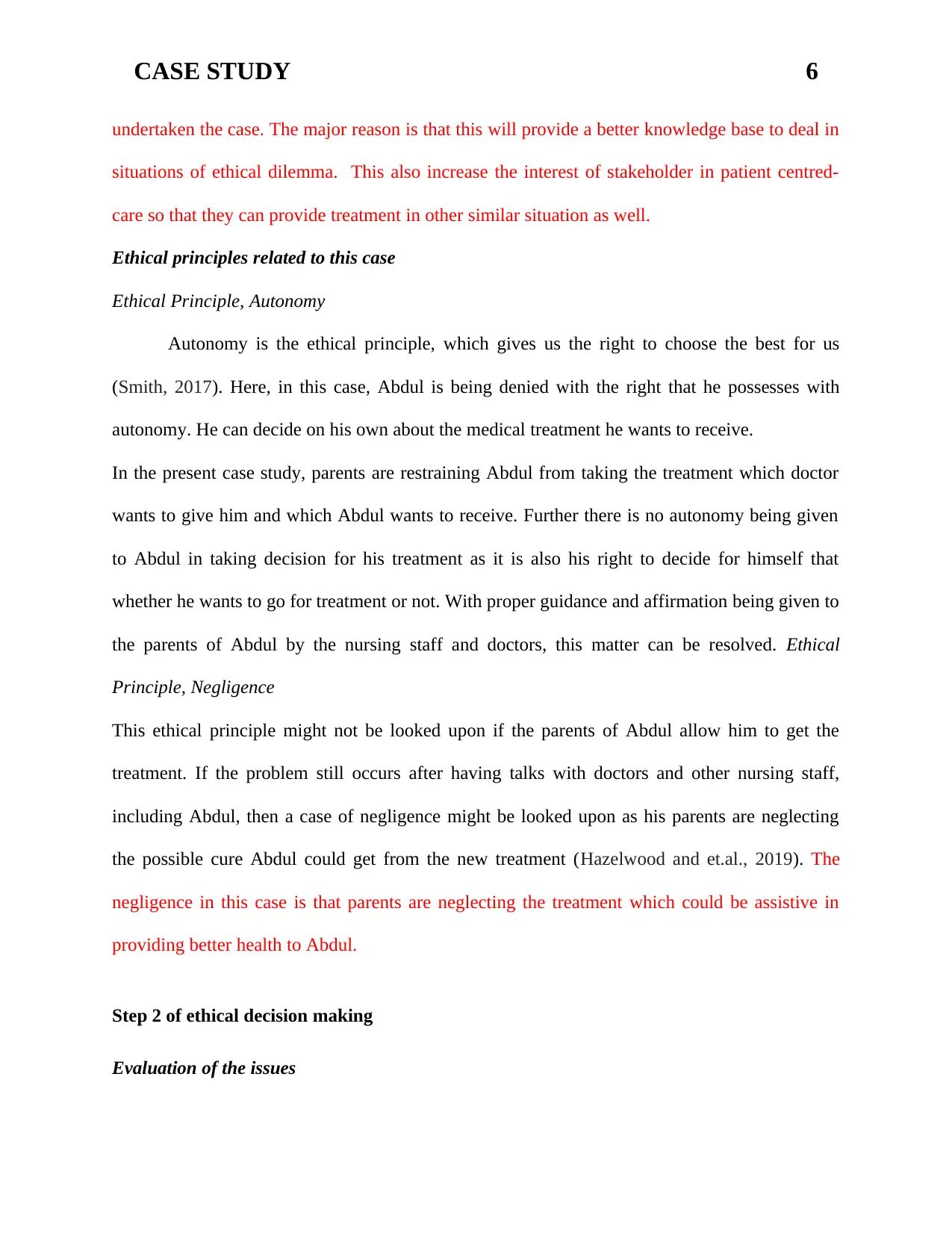
CASE STUDY 6
undertaken the case. The major reason is that this will provide a better knowledge base to deal in
situations of ethical dilemma. This also increase the interest of stakeholder in patient centred-
care so that they can provide treatment in other similar situation as well.
Ethical principles related to this case
Ethical Principle, Autonomy
Autonomy is the ethical principle, which gives us the right to choose the best for us
(Smith, 2017). Here, in this case, Abdul is being denied with the right that he possesses with
autonomy. He can decide on his own about the medical treatment he wants to receive.
In the present case study, parents are restraining Abdul from taking the treatment which doctor
wants to give him and which Abdul wants to receive. Further there is no autonomy being given
to Abdul in taking decision for his treatment as it is also his right to decide for himself that
whether he wants to go for treatment or not. With proper guidance and affirmation being given to
the parents of Abdul by the nursing staff and doctors, this matter can be resolved. Ethical
Principle, Negligence
This ethical principle might not be looked upon if the parents of Abdul allow him to get the
treatment. If the problem still occurs after having talks with doctors and other nursing staff,
including Abdul, then a case of negligence might be looked upon as his parents are neglecting
the possible cure Abdul could get from the new treatment (Hazelwood and et.al., 2019). The
negligence in this case is that parents are neglecting the treatment which could be assistive in
providing better health to Abdul.
Step 2 of ethical decision making
Evaluation of the issues
undertaken the case. The major reason is that this will provide a better knowledge base to deal in
situations of ethical dilemma. This also increase the interest of stakeholder in patient centred-
care so that they can provide treatment in other similar situation as well.
Ethical principles related to this case
Ethical Principle, Autonomy
Autonomy is the ethical principle, which gives us the right to choose the best for us
(Smith, 2017). Here, in this case, Abdul is being denied with the right that he possesses with
autonomy. He can decide on his own about the medical treatment he wants to receive.
In the present case study, parents are restraining Abdul from taking the treatment which doctor
wants to give him and which Abdul wants to receive. Further there is no autonomy being given
to Abdul in taking decision for his treatment as it is also his right to decide for himself that
whether he wants to go for treatment or not. With proper guidance and affirmation being given to
the parents of Abdul by the nursing staff and doctors, this matter can be resolved. Ethical
Principle, Negligence
This ethical principle might not be looked upon if the parents of Abdul allow him to get the
treatment. If the problem still occurs after having talks with doctors and other nursing staff,
including Abdul, then a case of negligence might be looked upon as his parents are neglecting
the possible cure Abdul could get from the new treatment (Hazelwood and et.al., 2019). The
negligence in this case is that parents are neglecting the treatment which could be assistive in
providing better health to Abdul.
Step 2 of ethical decision making
Evaluation of the issues
⊘ This is a preview!⊘
Do you want full access?
Subscribe today to unlock all pages.

Trusted by 1+ million students worldwide
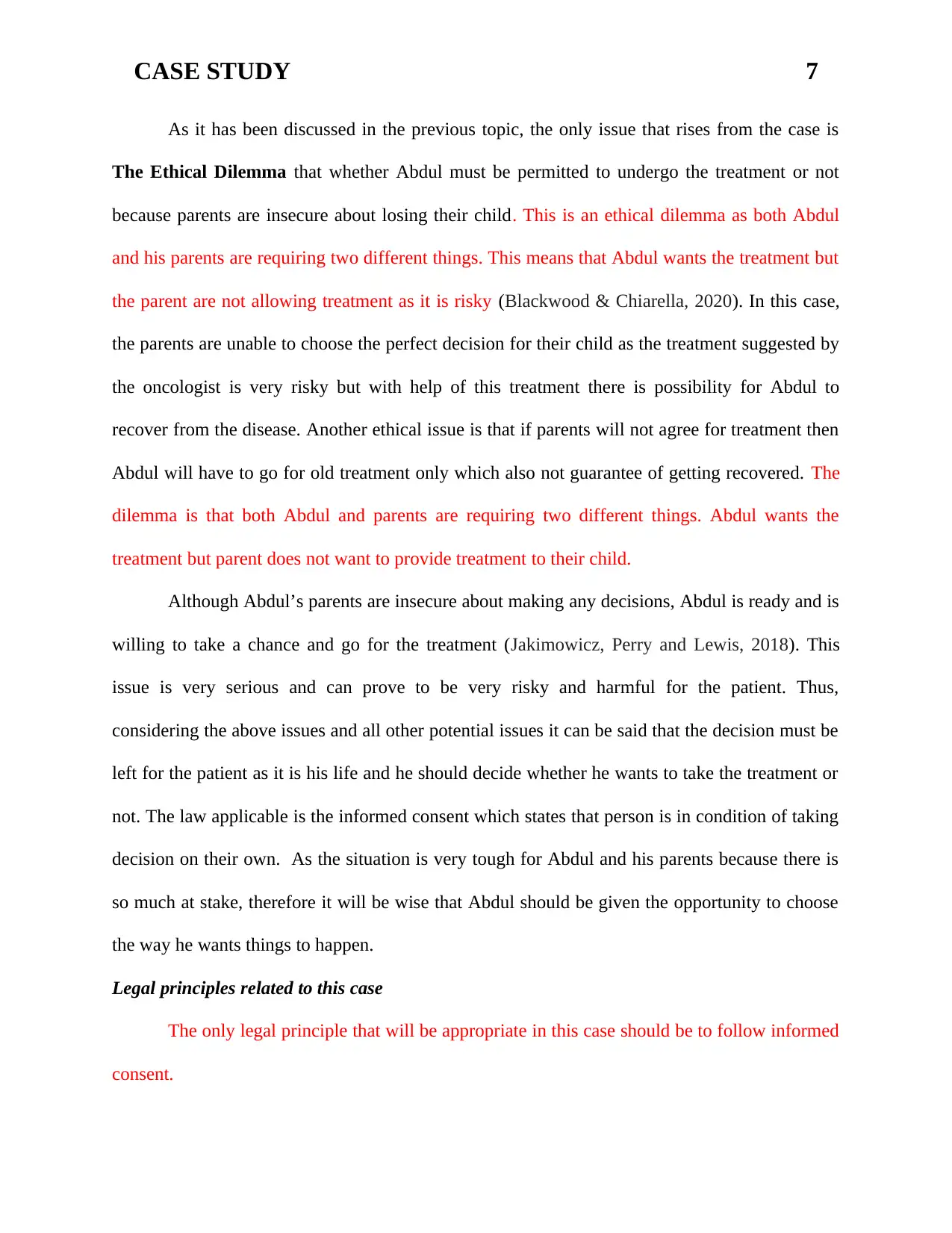
CASE STUDY 7
As it has been discussed in the previous topic, the only issue that rises from the case is
The Ethical Dilemma that whether Abdul must be permitted to undergo the treatment or not
because parents are insecure about losing their child. This is an ethical dilemma as both Abdul
and his parents are requiring two different things. This means that Abdul wants the treatment but
the parent are not allowing treatment as it is risky (Blackwood & Chiarella, 2020). In this case,
the parents are unable to choose the perfect decision for their child as the treatment suggested by
the oncologist is very risky but with help of this treatment there is possibility for Abdul to
recover from the disease. Another ethical issue is that if parents will not agree for treatment then
Abdul will have to go for old treatment only which also not guarantee of getting recovered. The
dilemma is that both Abdul and parents are requiring two different things. Abdul wants the
treatment but parent does not want to provide treatment to their child.
Although Abdul’s parents are insecure about making any decisions, Abdul is ready and is
willing to take a chance and go for the treatment (Jakimowicz, Perry and Lewis, 2018). This
issue is very serious and can prove to be very risky and harmful for the patient. Thus,
considering the above issues and all other potential issues it can be said that the decision must be
left for the patient as it is his life and he should decide whether he wants to take the treatment or
not. The law applicable is the informed consent which states that person is in condition of taking
decision on their own. As the situation is very tough for Abdul and his parents because there is
so much at stake, therefore it will be wise that Abdul should be given the opportunity to choose
the way he wants things to happen.
Legal principles related to this case
The only legal principle that will be appropriate in this case should be to follow informed
consent.
As it has been discussed in the previous topic, the only issue that rises from the case is
The Ethical Dilemma that whether Abdul must be permitted to undergo the treatment or not
because parents are insecure about losing their child. This is an ethical dilemma as both Abdul
and his parents are requiring two different things. This means that Abdul wants the treatment but
the parent are not allowing treatment as it is risky (Blackwood & Chiarella, 2020). In this case,
the parents are unable to choose the perfect decision for their child as the treatment suggested by
the oncologist is very risky but with help of this treatment there is possibility for Abdul to
recover from the disease. Another ethical issue is that if parents will not agree for treatment then
Abdul will have to go for old treatment only which also not guarantee of getting recovered. The
dilemma is that both Abdul and parents are requiring two different things. Abdul wants the
treatment but parent does not want to provide treatment to their child.
Although Abdul’s parents are insecure about making any decisions, Abdul is ready and is
willing to take a chance and go for the treatment (Jakimowicz, Perry and Lewis, 2018). This
issue is very serious and can prove to be very risky and harmful for the patient. Thus,
considering the above issues and all other potential issues it can be said that the decision must be
left for the patient as it is his life and he should decide whether he wants to take the treatment or
not. The law applicable is the informed consent which states that person is in condition of taking
decision on their own. As the situation is very tough for Abdul and his parents because there is
so much at stake, therefore it will be wise that Abdul should be given the opportunity to choose
the way he wants things to happen.
Legal principles related to this case
The only legal principle that will be appropriate in this case should be to follow informed
consent.
Paraphrase This Document
Need a fresh take? Get an instant paraphrase of this document with our AI Paraphraser
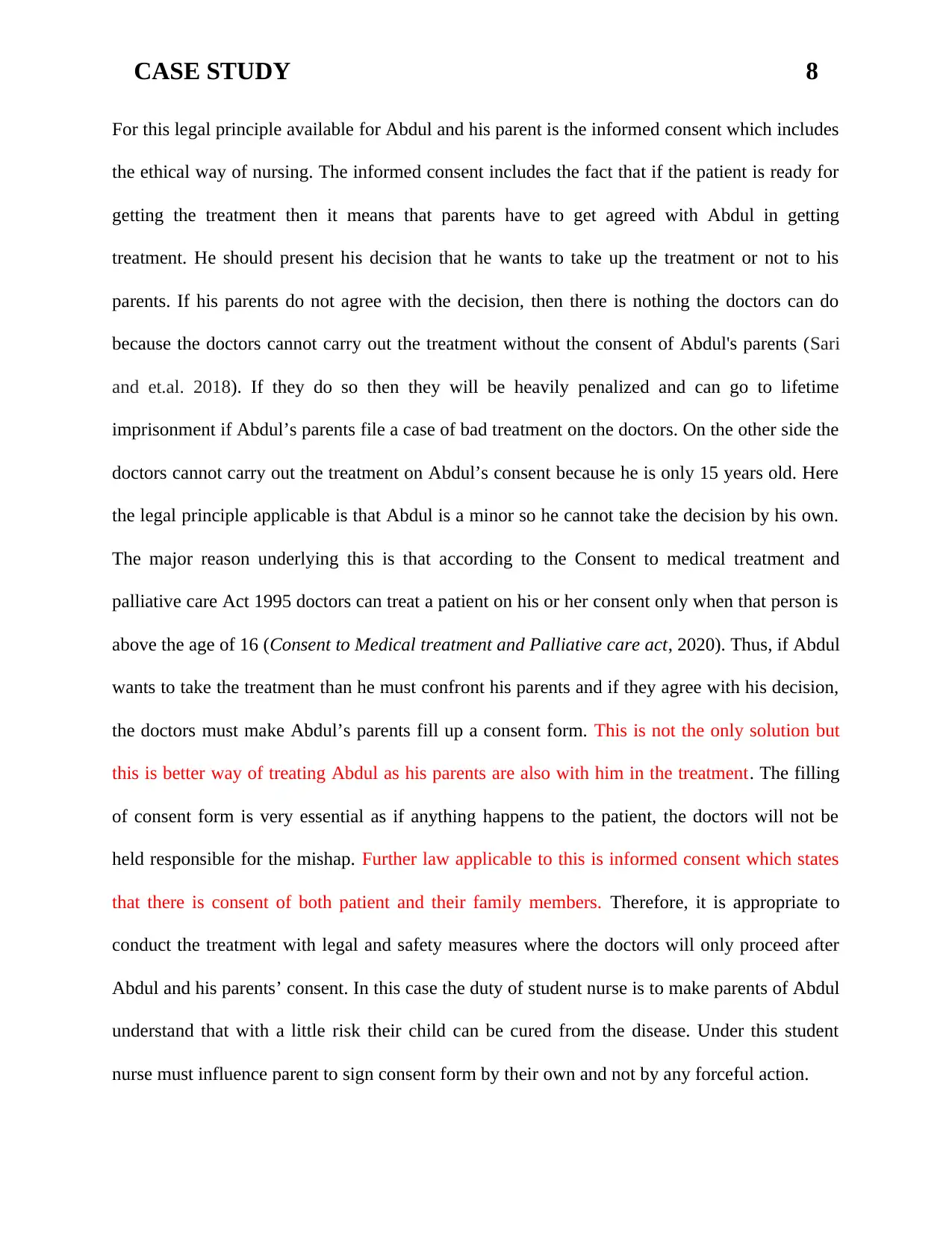
CASE STUDY 8
For this legal principle available for Abdul and his parent is the informed consent which includes
the ethical way of nursing. The informed consent includes the fact that if the patient is ready for
getting the treatment then it means that parents have to get agreed with Abdul in getting
treatment. He should present his decision that he wants to take up the treatment or not to his
parents. If his parents do not agree with the decision, then there is nothing the doctors can do
because the doctors cannot carry out the treatment without the consent of Abdul's parents (Sari
and et.al. 2018). If they do so then they will be heavily penalized and can go to lifetime
imprisonment if Abdul’s parents file a case of bad treatment on the doctors. On the other side the
doctors cannot carry out the treatment on Abdul’s consent because he is only 15 years old. Here
the legal principle applicable is that Abdul is a minor so he cannot take the decision by his own.
The major reason underlying this is that according to the Consent to medical treatment and
palliative care Act 1995 doctors can treat a patient on his or her consent only when that person is
above the age of 16 (Consent to Medical treatment and Palliative care act, 2020). Thus, if Abdul
wants to take the treatment than he must confront his parents and if they agree with his decision,
the doctors must make Abdul’s parents fill up a consent form. This is not the only solution but
this is better way of treating Abdul as his parents are also with him in the treatment. The filling
of consent form is very essential as if anything happens to the patient, the doctors will not be
held responsible for the mishap. Further law applicable to this is informed consent which states
that there is consent of both patient and their family members. Therefore, it is appropriate to
conduct the treatment with legal and safety measures where the doctors will only proceed after
Abdul and his parents’ consent. In this case the duty of student nurse is to make parents of Abdul
understand that with a little risk their child can be cured from the disease. Under this student
nurse must influence parent to sign consent form by their own and not by any forceful action.
For this legal principle available for Abdul and his parent is the informed consent which includes
the ethical way of nursing. The informed consent includes the fact that if the patient is ready for
getting the treatment then it means that parents have to get agreed with Abdul in getting
treatment. He should present his decision that he wants to take up the treatment or not to his
parents. If his parents do not agree with the decision, then there is nothing the doctors can do
because the doctors cannot carry out the treatment without the consent of Abdul's parents (Sari
and et.al. 2018). If they do so then they will be heavily penalized and can go to lifetime
imprisonment if Abdul’s parents file a case of bad treatment on the doctors. On the other side the
doctors cannot carry out the treatment on Abdul’s consent because he is only 15 years old. Here
the legal principle applicable is that Abdul is a minor so he cannot take the decision by his own.
The major reason underlying this is that according to the Consent to medical treatment and
palliative care Act 1995 doctors can treat a patient on his or her consent only when that person is
above the age of 16 (Consent to Medical treatment and Palliative care act, 2020). Thus, if Abdul
wants to take the treatment than he must confront his parents and if they agree with his decision,
the doctors must make Abdul’s parents fill up a consent form. This is not the only solution but
this is better way of treating Abdul as his parents are also with him in the treatment. The filling
of consent form is very essential as if anything happens to the patient, the doctors will not be
held responsible for the mishap. Further law applicable to this is informed consent which states
that there is consent of both patient and their family members. Therefore, it is appropriate to
conduct the treatment with legal and safety measures where the doctors will only proceed after
Abdul and his parents’ consent. In this case the duty of student nurse is to make parents of Abdul
understand that with a little risk their child can be cured from the disease. Under this student
nurse must influence parent to sign consent form by their own and not by any forceful action.
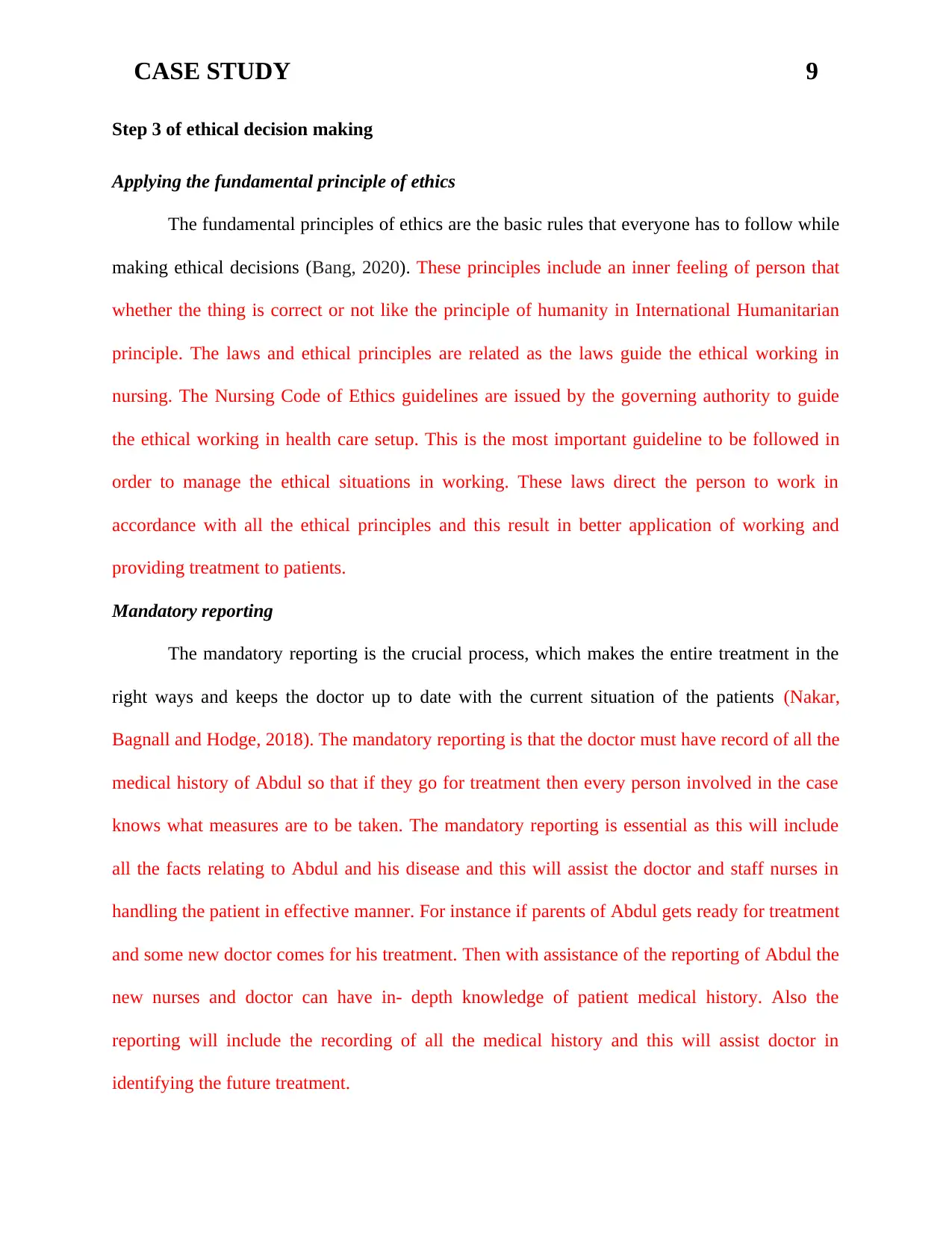
CASE STUDY 9
Step 3 of ethical decision making
Applying the fundamental principle of ethics
The fundamental principles of ethics are the basic rules that everyone has to follow while
making ethical decisions (Bang, 2020). These principles include an inner feeling of person that
whether the thing is correct or not like the principle of humanity in International Humanitarian
principle. The laws and ethical principles are related as the laws guide the ethical working in
nursing. The Nursing Code of Ethics guidelines are issued by the governing authority to guide
the ethical working in health care setup. This is the most important guideline to be followed in
order to manage the ethical situations in working. These laws direct the person to work in
accordance with all the ethical principles and this result in better application of working and
providing treatment to patients.
Mandatory reporting
The mandatory reporting is the crucial process, which makes the entire treatment in the
right ways and keeps the doctor up to date with the current situation of the patients (Nakar,
Bagnall and Hodge, 2018). The mandatory reporting is that the doctor must have record of all the
medical history of Abdul so that if they go for treatment then every person involved in the case
knows what measures are to be taken. The mandatory reporting is essential as this will include
all the facts relating to Abdul and his disease and this will assist the doctor and staff nurses in
handling the patient in effective manner. For instance if parents of Abdul gets ready for treatment
and some new doctor comes for his treatment. Then with assistance of the reporting of Abdul the
new nurses and doctor can have in- depth knowledge of patient medical history. Also the
reporting will include the recording of all the medical history and this will assist doctor in
identifying the future treatment.
Step 3 of ethical decision making
Applying the fundamental principle of ethics
The fundamental principles of ethics are the basic rules that everyone has to follow while
making ethical decisions (Bang, 2020). These principles include an inner feeling of person that
whether the thing is correct or not like the principle of humanity in International Humanitarian
principle. The laws and ethical principles are related as the laws guide the ethical working in
nursing. The Nursing Code of Ethics guidelines are issued by the governing authority to guide
the ethical working in health care setup. This is the most important guideline to be followed in
order to manage the ethical situations in working. These laws direct the person to work in
accordance with all the ethical principles and this result in better application of working and
providing treatment to patients.
Mandatory reporting
The mandatory reporting is the crucial process, which makes the entire treatment in the
right ways and keeps the doctor up to date with the current situation of the patients (Nakar,
Bagnall and Hodge, 2018). The mandatory reporting is that the doctor must have record of all the
medical history of Abdul so that if they go for treatment then every person involved in the case
knows what measures are to be taken. The mandatory reporting is essential as this will include
all the facts relating to Abdul and his disease and this will assist the doctor and staff nurses in
handling the patient in effective manner. For instance if parents of Abdul gets ready for treatment
and some new doctor comes for his treatment. Then with assistance of the reporting of Abdul the
new nurses and doctor can have in- depth knowledge of patient medical history. Also the
reporting will include the recording of all the medical history and this will assist doctor in
identifying the future treatment.
⊘ This is a preview!⊘
Do you want full access?
Subscribe today to unlock all pages.

Trusted by 1+ million students worldwide
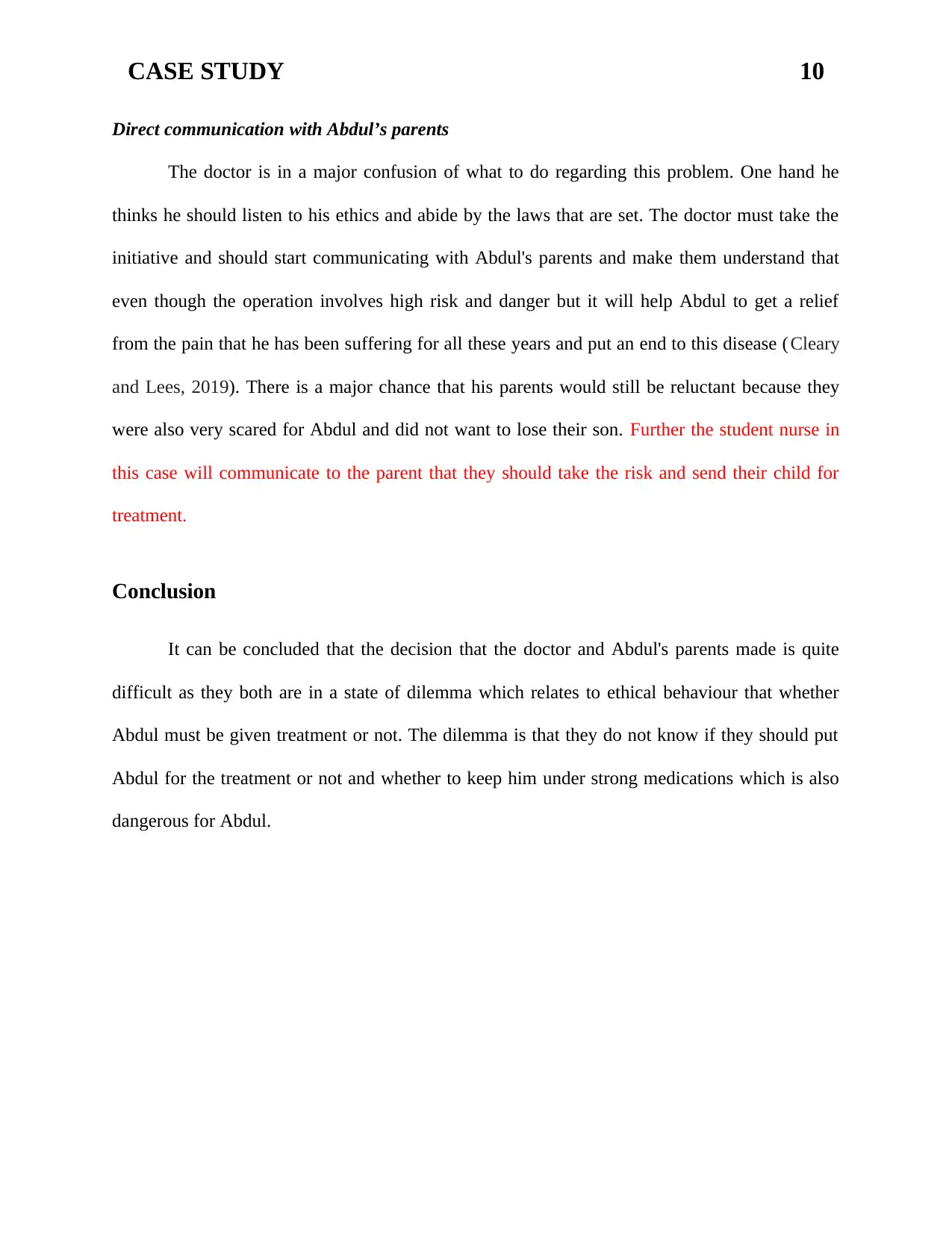
CASE STUDY 10
Direct communication with Abdul’s parents
The doctor is in a major confusion of what to do regarding this problem. One hand he
thinks he should listen to his ethics and abide by the laws that are set. The doctor must take the
initiative and should start communicating with Abdul's parents and make them understand that
even though the operation involves high risk and danger but it will help Abdul to get a relief
from the pain that he has been suffering for all these years and put an end to this disease ( Cleary
and Lees, 2019). There is a major chance that his parents would still be reluctant because they
were also very scared for Abdul and did not want to lose their son. Further the student nurse in
this case will communicate to the parent that they should take the risk and send their child for
treatment.
Conclusion
It can be concluded that the decision that the doctor and Abdul's parents made is quite
difficult as they both are in a state of dilemma which relates to ethical behaviour that whether
Abdul must be given treatment or not. The dilemma is that they do not know if they should put
Abdul for the treatment or not and whether to keep him under strong medications which is also
dangerous for Abdul.
Direct communication with Abdul’s parents
The doctor is in a major confusion of what to do regarding this problem. One hand he
thinks he should listen to his ethics and abide by the laws that are set. The doctor must take the
initiative and should start communicating with Abdul's parents and make them understand that
even though the operation involves high risk and danger but it will help Abdul to get a relief
from the pain that he has been suffering for all these years and put an end to this disease ( Cleary
and Lees, 2019). There is a major chance that his parents would still be reluctant because they
were also very scared for Abdul and did not want to lose their son. Further the student nurse in
this case will communicate to the parent that they should take the risk and send their child for
treatment.
Conclusion
It can be concluded that the decision that the doctor and Abdul's parents made is quite
difficult as they both are in a state of dilemma which relates to ethical behaviour that whether
Abdul must be given treatment or not. The dilemma is that they do not know if they should put
Abdul for the treatment or not and whether to keep him under strong medications which is also
dangerous for Abdul.
Paraphrase This Document
Need a fresh take? Get an instant paraphrase of this document with our AI Paraphraser
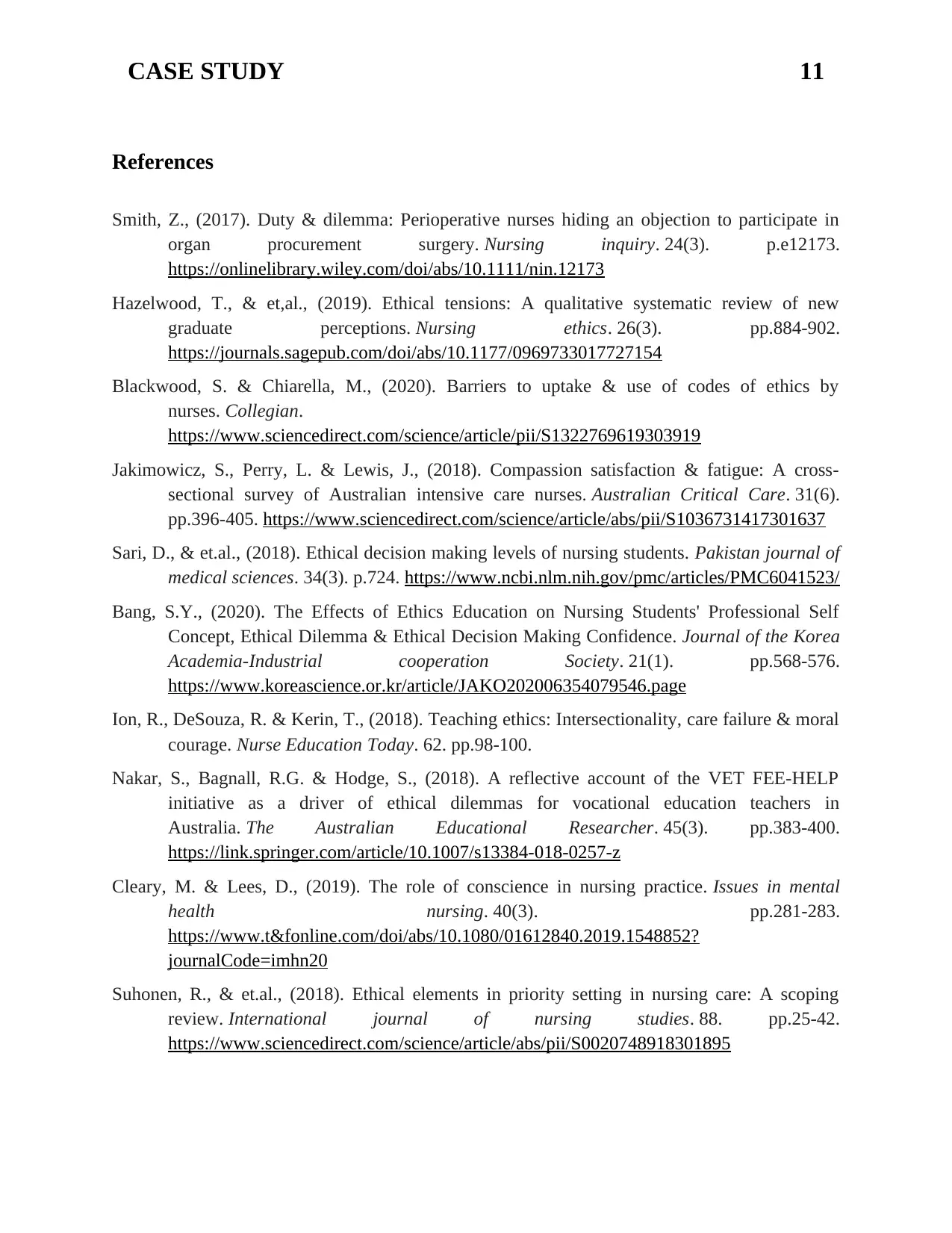
CASE STUDY 11
References
Smith, Z., (2017). Duty & dilemma: Perioperative nurses hiding an objection to participate in
organ procurement surgery. Nursing inquiry. 24(3). p.e12173.
https://onlinelibrary.wiley.com/doi/abs/10.1111/nin.12173
Hazelwood, T., & et,al., (2019). Ethical tensions: A qualitative systematic review of new
graduate perceptions. Nursing ethics. 26(3). pp.884-902.
https://journals.sagepub.com/doi/abs/10.1177/0969733017727154
Blackwood, S. & Chiarella, M., (2020). Barriers to uptake & use of codes of ethics by
nurses. Collegian.
https://www.sciencedirect.com/science/article/pii/S1322769619303919
Jakimowicz, S., Perry, L. & Lewis, J., (2018). Compassion satisfaction & fatigue: A cross-
sectional survey of Australian intensive care nurses. Australian Critical Care. 31(6).
pp.396-405. https://www.sciencedirect.com/science/article/abs/pii/S1036731417301637
Sari, D., & et.al., (2018). Ethical decision making levels of nursing students. Pakistan journal of
medical sciences. 34(3). p.724. https://www.ncbi.nlm.nih.gov/pmc/articles/PMC6041523/
Bang, S.Y., (2020). The Effects of Ethics Education on Nursing Students' Professional Self
Concept, Ethical Dilemma & Ethical Decision Making Confidence. Journal of the Korea
Academia-Industrial cooperation Society. 21(1). pp.568-576.
https://www.koreascience.or.kr/article/JAKO202006354079546.page
Ion, R., DeSouza, R. & Kerin, T., (2018). Teaching ethics: Intersectionality, care failure & moral
courage. Nurse Education Today. 62. pp.98-100.
Nakar, S., Bagnall, R.G. & Hodge, S., (2018). A reflective account of the VET FEE-HELP
initiative as a driver of ethical dilemmas for vocational education teachers in
Australia. The Australian Educational Researcher. 45(3). pp.383-400.
https://link.springer.com/article/10.1007/s13384-018-0257-z
Cleary, M. & Lees, D., (2019). The role of conscience in nursing practice. Issues in mental
health nursing. 40(3). pp.281-283.
https://www.t&fonline.com/doi/abs/10.1080/01612840.2019.1548852?
journalCode=imhn20
Suhonen, R., & et.al., (2018). Ethical elements in priority setting in nursing care: A scoping
review. International journal of nursing studies. 88. pp.25-42.
https://www.sciencedirect.com/science/article/abs/pii/S0020748918301895
References
Smith, Z., (2017). Duty & dilemma: Perioperative nurses hiding an objection to participate in
organ procurement surgery. Nursing inquiry. 24(3). p.e12173.
https://onlinelibrary.wiley.com/doi/abs/10.1111/nin.12173
Hazelwood, T., & et,al., (2019). Ethical tensions: A qualitative systematic review of new
graduate perceptions. Nursing ethics. 26(3). pp.884-902.
https://journals.sagepub.com/doi/abs/10.1177/0969733017727154
Blackwood, S. & Chiarella, M., (2020). Barriers to uptake & use of codes of ethics by
nurses. Collegian.
https://www.sciencedirect.com/science/article/pii/S1322769619303919
Jakimowicz, S., Perry, L. & Lewis, J., (2018). Compassion satisfaction & fatigue: A cross-
sectional survey of Australian intensive care nurses. Australian Critical Care. 31(6).
pp.396-405. https://www.sciencedirect.com/science/article/abs/pii/S1036731417301637
Sari, D., & et.al., (2018). Ethical decision making levels of nursing students. Pakistan journal of
medical sciences. 34(3). p.724. https://www.ncbi.nlm.nih.gov/pmc/articles/PMC6041523/
Bang, S.Y., (2020). The Effects of Ethics Education on Nursing Students' Professional Self
Concept, Ethical Dilemma & Ethical Decision Making Confidence. Journal of the Korea
Academia-Industrial cooperation Society. 21(1). pp.568-576.
https://www.koreascience.or.kr/article/JAKO202006354079546.page
Ion, R., DeSouza, R. & Kerin, T., (2018). Teaching ethics: Intersectionality, care failure & moral
courage. Nurse Education Today. 62. pp.98-100.
Nakar, S., Bagnall, R.G. & Hodge, S., (2018). A reflective account of the VET FEE-HELP
initiative as a driver of ethical dilemmas for vocational education teachers in
Australia. The Australian Educational Researcher. 45(3). pp.383-400.
https://link.springer.com/article/10.1007/s13384-018-0257-z
Cleary, M. & Lees, D., (2019). The role of conscience in nursing practice. Issues in mental
health nursing. 40(3). pp.281-283.
https://www.t&fonline.com/doi/abs/10.1080/01612840.2019.1548852?
journalCode=imhn20
Suhonen, R., & et.al., (2018). Ethical elements in priority setting in nursing care: A scoping
review. International journal of nursing studies. 88. pp.25-42.
https://www.sciencedirect.com/science/article/abs/pii/S0020748918301895
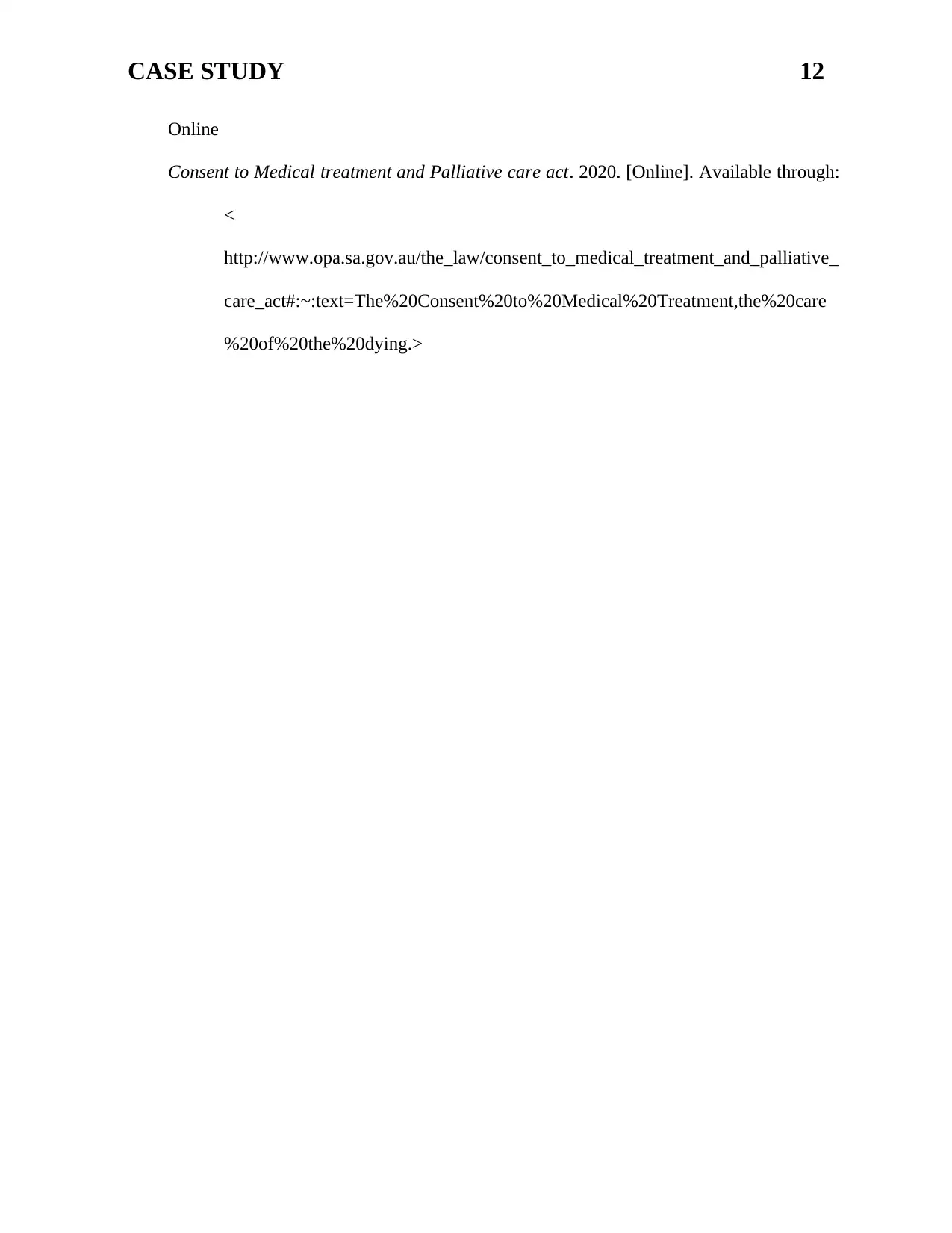
CASE STUDY 12
Online
Consent to Medical treatment and Palliative care act. 2020. [Online]. Available through:
<
http://www.opa.sa.gov.au/the_law/consent_to_medical_treatment_and_palliative_
care_act#:~:text=The%20Consent%20to%20Medical%20Treatment,the%20care
%20of%20the%20dying.>
Online
Consent to Medical treatment and Palliative care act. 2020. [Online]. Available through:
<
http://www.opa.sa.gov.au/the_law/consent_to_medical_treatment_and_palliative_
care_act#:~:text=The%20Consent%20to%20Medical%20Treatment,the%20care
%20of%20the%20dying.>
⊘ This is a preview!⊘
Do you want full access?
Subscribe today to unlock all pages.

Trusted by 1+ million students worldwide
1 out of 12
Related Documents
Your All-in-One AI-Powered Toolkit for Academic Success.
+13062052269
info@desklib.com
Available 24*7 on WhatsApp / Email
![[object Object]](/_next/static/media/star-bottom.7253800d.svg)
Unlock your academic potential
Copyright © 2020–2025 A2Z Services. All Rights Reserved. Developed and managed by ZUCOL.





